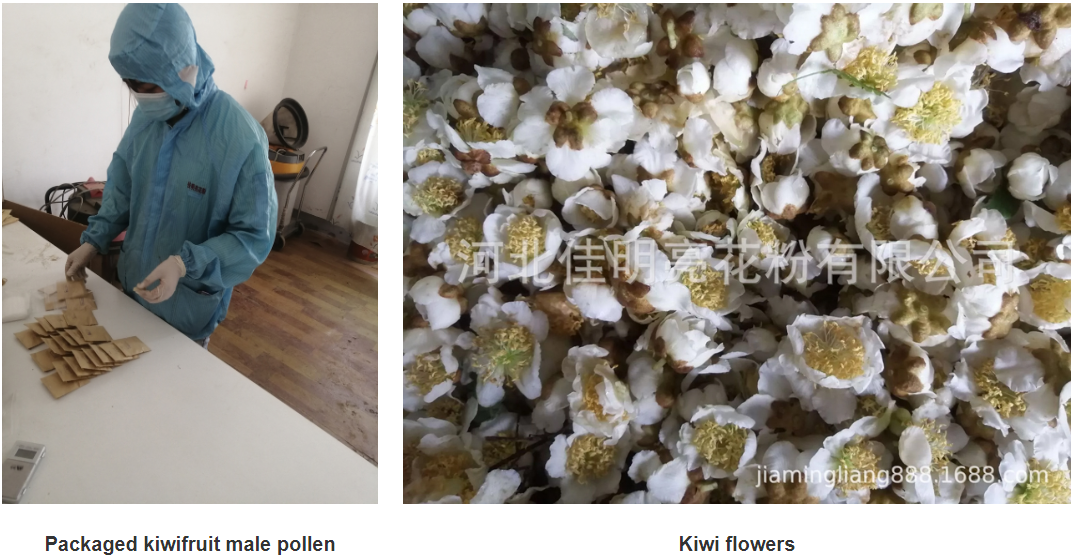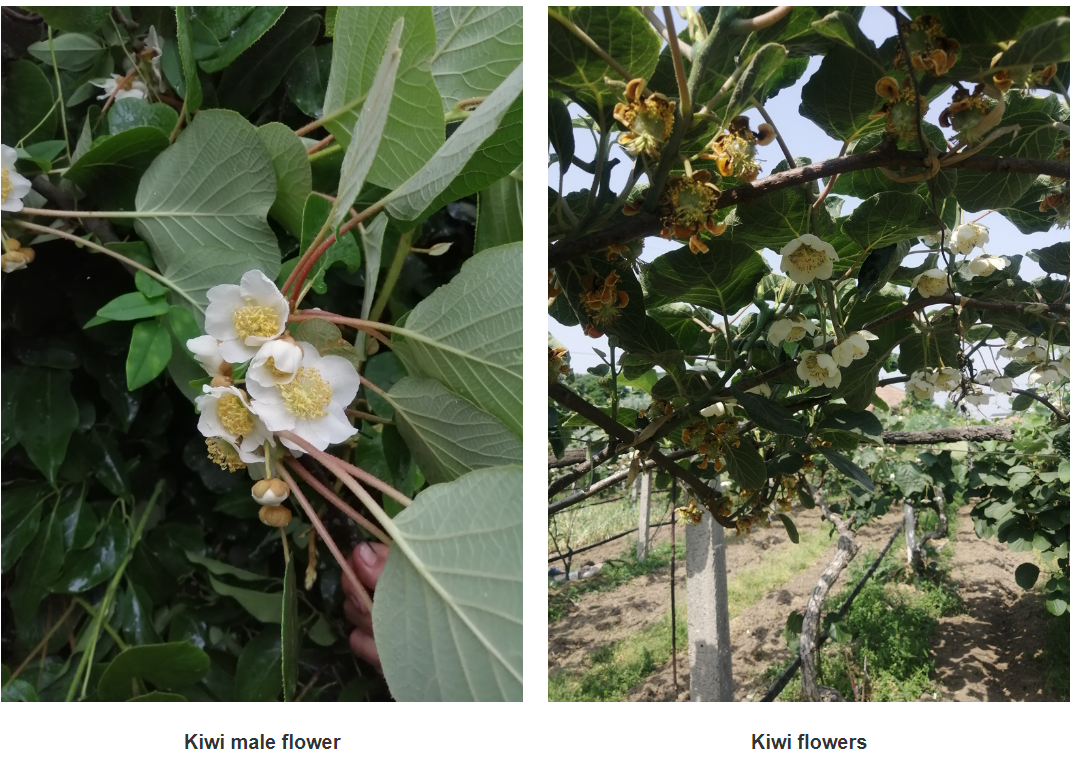Sep . 28, 2025 05:50 Back to list
Kiwifruit Male Pollen for Pollination - Hebei Jiamingliang Pollen Co., Ltd.
Introduction
The kiwi pollen plays a pivotal role in the agricultural industry, particularly in the cultivation of kiwifruit. As a dioecious plant, the kiwifruit requires cross-pollination between male and female trees to produce fruit. This article delves into the features, benefits, technical specifications, and applications of male kiwi pollen for sale, while highlighting the expertise of Hebei Jiamingliang Pollen Co., Ltd., a leading supplier in this field.
Product Overview
Produced by Hebei Jiamingliang Pollen Co., Ltd., the kiwifruit male pollen is specifically designed for pollinating female kiwifruit trees. This product ensures optimal germination and fertilization, which are critical for achieving high-quality fruit yields. The pollen is sourced from male kiwifruit flowers and undergoes rigorous quality control to maintain its viability and effectiveness.


Key Features and Benefits
The kiwifruit male pollen offers several advantages to farmers and agricultural professionals:
- High Germination Rate: With an 80% germination percentage, this pollen ensures a high success rate in pollination, leading to better fruit set and quality.
- Optimal Storage Conditions: The pollen must be stored at specific temperatures to maintain its viability. For short-term use (within 3 days), cold storage is recommended. For longer periods (more than a week), freezing at -18°C is necessary. Before use, the pollen should be allowed to reach room temperature for 12 hours to reactivate its activity.
- Weather Sensitivity: The pollen is effective only within a temperature range of 15°C to 25°C. Extreme temperatures can reduce its efficacy, making it crucial for farmers to monitor weather conditions during application.
- Moisture Control: The pollen must be kept dry during storage and transport. If moisture is detected, the pollen should not be used, as it may lose its activity.
- Application Flexibility: The pollen is suitable for various kiwifruit varieties, making it a versatile solution for different agricultural needs.
Technical Specifications
| Feature | Details |
|---|---|
| Pollen Source | Kiwifruit male pollen |
| Suitable Varieties | Kiwifruit female plants |
| Germination Percentage | 80% |
| Storage Requirements | Cold storage (3 days) or freezer at -18°C (long-term) |
| Optimal Temperature Range | 15°C - 25°C |
| Moisture Sensitivity | Must be kept dry; avoid use if moist |
| Application Conditions | Re-pollinate if rain occurs within 5 hours of application |
Applications in Agriculture
The kiwifruit male pollen is essential for the successful pollination of female kiwifruit trees. This process is critical for the development of fruits, as without adequate pollination, female trees cannot produce the high-quality fruit that the market demands. The pollen is typically applied during the flowering period, ensuring that the female flowers receive sufficient pollen to facilitate fertilization.
According to the National Institute of Standards and Technology (NIST), the precision of agricultural practices, including pollination, is vital for ensuring consistent crop yields and quality. NIST emphasizes the importance of standardized procedures in agriculture to enhance productivity and sustainability. The kiwifruit male pollen aligns with these standards by providing a reliable and effective solution for pollination.
Company Background: Hebei Jiamingliang Pollen Co., Ltd.
Hebei Jiamingliang Pollen Co., Ltd. is a reputable company specializing in the production and supply of high-quality pollen products. With six dedicated kiwifruit pollen bases, the company ensures a consistent supply of pollen to meet the demands of orchards. This infrastructure allows them to address pollen shortages and provide farmers with reliable resources for their agricultural practices.
The company's commitment to quality is evident in its meticulous selection of male kiwifruit trees for pollen collection. By focusing on the cultivation of male trees, Hebei Jiamingliang Pollen Co., Ltd. ensures that the pollen produced is of the highest standard, capable of enhancing the productivity of female kiwifruit trees.
Challenges and Considerations
While the kiwifruit male pollen offers significant benefits, there are several challenges that farmers must consider:
- Weather Conditions: The effectiveness of the pollen is highly dependent on environmental factors, particularly temperature and humidity. Farmers must carefully monitor weather conditions to ensure optimal pollination.
- Timing: The timing of pollen application is critical. If the flowering periods of male and female trees are not aligned, the pollination process may be compromised.
- Storage and Handling: Proper storage and handling are essential to maintain the pollen's viability. Any deviation from recommended storage conditions can lead to a loss of activity.
Conclusion
The kiwifruit male pollen is a vital component in the agricultural process, ensuring the successful pollination of female kiwifruit trees. With its high germination rate, optimal storage requirements, and versatility, this product provides a reliable solution for farmers seeking to enhance their yields and fruit quality. Hebei Jiamingliang Pollen Co., Ltd. stands out as a leader in this field, offering a consistent supply of high-quality pollen through its dedicated facilities.
As the agricultural industry continues to evolve, the importance of precise and effective pollination methods cannot be overstated. The kiwifruit male pollen exemplifies the advancements in agricultural technology, contributing to the sustainability and productivity of kiwifruit cultivation. By adhering to best practices and leveraging the expertise of companies like Hebei Jiamingliang Pollen Co., Ltd., farmers can achieve optimal results and meet the growing demand for high-quality kiwifruit.
Source
NIST (National Institute of Standards and Technology) provides critical standards and research that support agricultural advancements and technological innovations.
-
Comprehensive Guide to CE Certification Apricot Pollen Health Benefits
NewsNov.24,2025
-
CE Certification Mango Fruit Protection Bags: Enhancing Export Quality & Sustainability
NewsNov.23,2025
-
CE Certification Varieties Suitable for Collecting Apple Pollen – Ensuring Quality & Compliance in Apple Breeding
NewsNov.22,2025
-
Comprehensive Guide to CE Certification Mango Cover Bags – Quality, Standards & Trends
NewsNov.22,2025
-
What You Need to Know About CE Certification Peach Blossom Powder Keto
NewsNov.21,2025
-
CE Certification Pear Pollen Collection Base – Ensuring Quality & Sustainability in Global Horticulture
NewsNov.20,2025